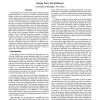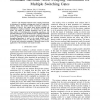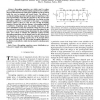46 search results - page 1 / 10 » Decoupling capacitance allocation for timing with statistica... |
ICCAD
2008
IEEE
14 years 1 months ago
2008
IEEE
Abstract— This paper presents an allocation method of decoupling capacitance that explicitly considers timing. We have found and focused that decap does not necessarily improve a...
ASPDAC
2007
ACM
13 years 8 months ago
2007
ACM
Power supply noise increases the circuit delay, which may lead to performance failure of a design. Decoupling capacitance (decap) addition is effective in reducing the power suppl...
ISQED
2008
IEEE
13 years 11 months ago
2008
IEEE
— The dominant substrate noise coupling mechanism is determined for multiple switching gates based on a physically intuitive model. The model exhibits reasonable accuracy as comp...
TVLSI
2008
13 years 4 months ago
2008
Decoupling capacitors are widely used to reduce power supply noise. On-chip decoupling capacitors have traditionally been allocated into the white space available on a die or place...
DAC
2006
ACM
14 years 5 months ago
2006
ACM
A statistical model for the purpose of logic cell timing analysis in the presence of process variations is presented. A new current-based cell delay model is utilized, which can a...



